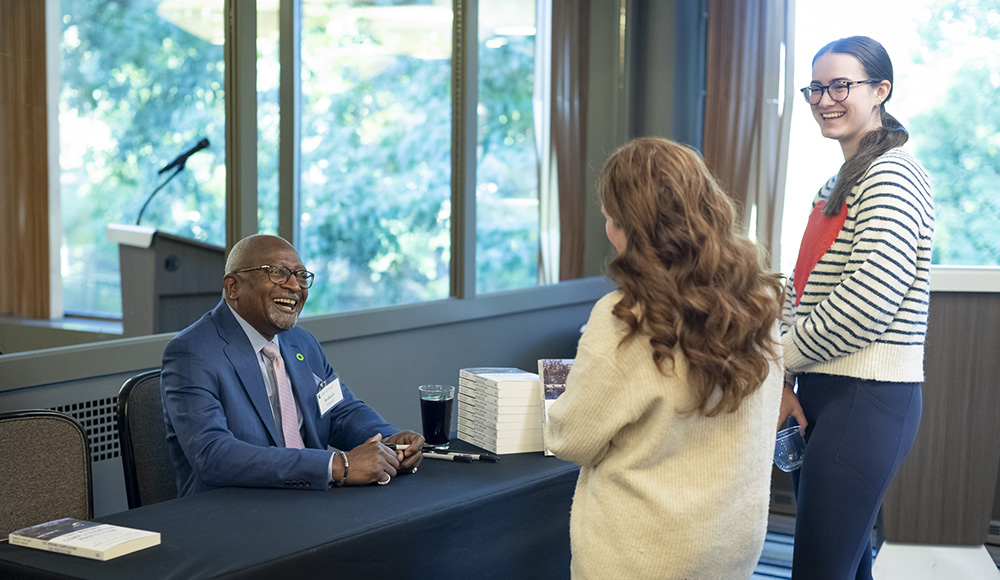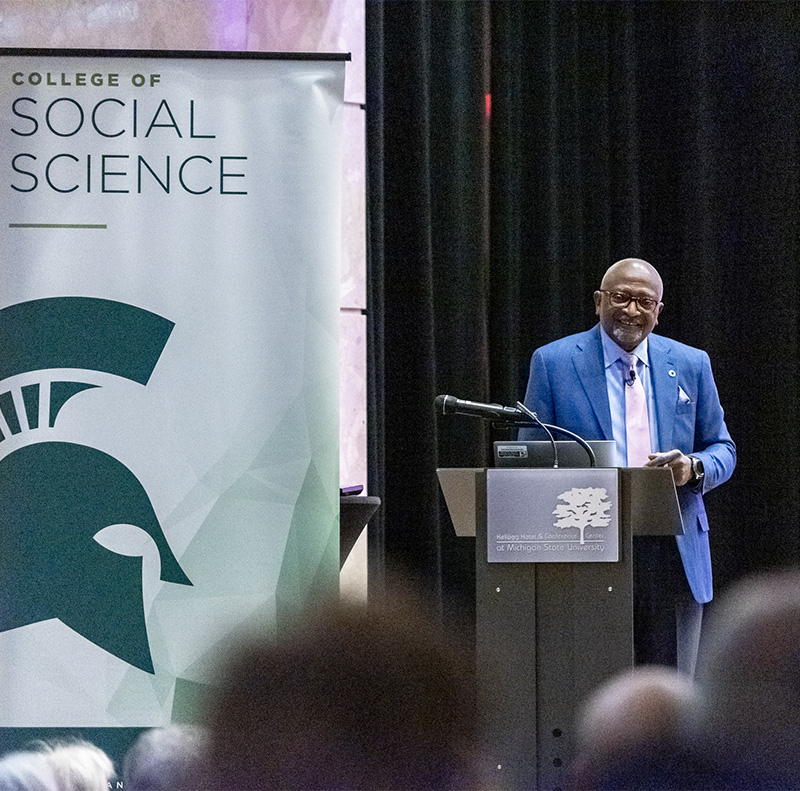Renowned environmentalist Dr. Robert D. Bullard speaks on campus as part of Kaplowitz Lecture Series
October 15, 2024 - Emily Jodway

Robert Bullard, commonly known as the father of environmental justice, gave a presentation on campus as part of the Kaplowitz Lecture Series in the Kellogg Center Auditorium on October 9, 2024. The series is named in honor of Sociology alumnus Stan Kaplowitz and his wife Toba. Photo credit: Jacqueline Hawthorne, MSU.
The College of Social Science welcomed Robert D. Bullard, PhD to campus on Wednesday as part of the Stan & Toba Kaplowitz Distinguished Lecture Series, where he spoke to a diverse audience of faculty, students and avid fans at the Kellogg Center Auditorium. Bullard is considered the founder of environmental justice and is currently Distinguished Professor of Urban Planning and Environmental Policy and Director of the Bullard Center for Environmental and Climate Justice at Texas Southern University.
Bullard is an award-winning author of 18 books addressing a wide array of topics, including sustainable development, environmental racism, climate justice, housing, transportation, community resilience and reinvestment, disasters and emergency response. Prior to coming to Texas Southern, he was the founding Director of the Environmental Justice Resource Center at Clark Atlanta University. He is co-founder of the HBCU Climate Change Consortium and a Fellow in the California Academy of Sciences. In 2021, President Joe Biden named him to the White House Environmental Justice Advisory Council. He has been recognized by numerous media outlets, universities and environmental organizations for his trailblazing work in the field of environmental justice.
Bullard’s lecture, “Environmental Justice from Footnote to Headline,” centers climate change as the defining global environmental justice, human rights and public health issue of the 21st century. His particular focus is on the US and its need for empowering vulnerable populations, as these are likely to suffer the earliest and most damaging setbacks due to a number of marginalizing factors, as well as identifying climate change ‘hot-spot’ zones and designing effective strategies for mitigation, emergency management, community resilience and disaster recovery. He further brings a social scientist’s lens to this lecture by offering a framework for dismantling systemic racism and policies and practices that create and perpetuate inequality.
 Bullard got his ‘start’ in environmental justice in 1979 while at Texas Southern University, when his then-wife, a local lawyer, brought a lawsuit against Southwestern Waste Management Corporation for excessive dumping in rural and racially segregated areas. She asked Bullard and his student researchers to look into neighborhood demographics to showcase evidence of this issue, and they found that 82 percent of waste in Houston was indeed being disposed of in predominantly Black communities.
Bullard got his ‘start’ in environmental justice in 1979 while at Texas Southern University, when his then-wife, a local lawyer, brought a lawsuit against Southwestern Waste Management Corporation for excessive dumping in rural and racially segregated areas. She asked Bullard and his student researchers to look into neighborhood demographics to showcase evidence of this issue, and they found that 82 percent of waste in Houston was indeed being disposed of in predominantly Black communities.
Since then, Bullard has been part of a group of passionate individuals doing grassroots activism, forming coalitions, meeting at conferences, and hosting marches and speeches in order to bring environmental justice to the forefront of people’s minds. Even 40 years later, neighborhoods with higher concentrations of Black and minority citizens are more likely to be polluted and are a backdrop for large landfills and oil refineries. Flood risk and excessive heat is also at an increased risk for these areas, with redlined neighborhoods already experiencing weather up to 13 degrees warmer than other areas. Climate change will impact the entire world, but here in the US, we need to turn our attention to the most at-risk areas, Bullard, explains, such as the South and Gulf Coast regions, and direct money and resources there first.
During the lecture, Bullard also stressed the importance of connecting the dots between research, data, facts and science with concrete action. Just writing books and conducting research in labs is not enough; in order to make transformative change, we need to work with our local communities and get this research into the hands of local and federal government organizations who can implement this change.
“The quest for justice is a marathon and a relay, not a sprint,” Bullard said. “You eventually have to pass the baton to the next generation, and we’re ready to have this intergenerational mobilization and to take this movement forward. We have the numbers, the resources, the community and university partnerships, and the will to do it. It’s just a matter of doing it. And I know we will get tired, but think about what the alternative is: not doing anything? This is a constant fight. If we are doing nothing, we are risking future generations, we’re risking this planet. That’s why we are fighting.”
The Kaplowitz Distinguished Lecture Series is an annual event that invites to campus a renowned scholar whose research aligns with environmental protection, democratic preservation or the reduction of economic inequality. Named after Stan and Toba Kaplowitz, the primary objective of the series is to foster intellectual engagement and encourage collaboration among faculty, staff and students surrounding these critical social issues. Stan spent over 41 years at MSU, teaching Political Sociology, Social Psychology, Attitudes and Quantitative Methods. His research centered around persuasion and attitude change, doctor-patient communication, racial attitudes and beliefs and other environmental-related topics. Toba was a preschool teacher and professor of Child Development at Lansing Community College.
The event was co-sponsored by the Department of Sociology, the Offices of Research and Innovation and Institutional Diversity and Inclusion, the Colleges of Natural Science, Human Medicine and Arts and Letters, the Water Alliance and Fate of the Earth ESPP.

